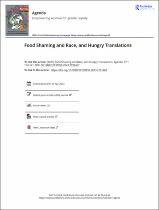Food shaming and race, and hungry translations
Abstract
Eating While Black: Food Shaming and Race in America by Psyche A. Williams-Forson (2022) and Hungry Translations: Relearning the World Through Radical Vulnerability by Richa Nagar (2019) deal with food and hunger in relation to the very different geo-political regions of North America and India. At the same time, they enter into dialogue with each other in exploring how socially situated bodies – othered in gendered, raced and neoliberal systems and discourses – navigate and resist oppressive food politics. As both authors also show, critical approaches to food politics should entail much more than attention to who gets to eat well, or why certain groups are able to waste food obscenely while most of the world’s population starves, cannot make informed and healthy food choices, or inhabits food deserts, those foodscapes of near-starvation created by the corporate food industry’s hunger for profits. As the authors show, exploring the politics of food, eating and hunger should focus also on the languages and attitudes surrounding how these are connected to radical struggles for human freedom. By focusing on the represented and imagined connections between human desires and experiences on one hand and food and hunger on the other, Williams-Forson and Nagar also encourage us to interrogate and re-imagine our relationships to both humans as well as nature and other living beings. These books’ perspectives from different continents invite us to consider the trans-continental context of multiple subaltern struggles through the lens of food.

